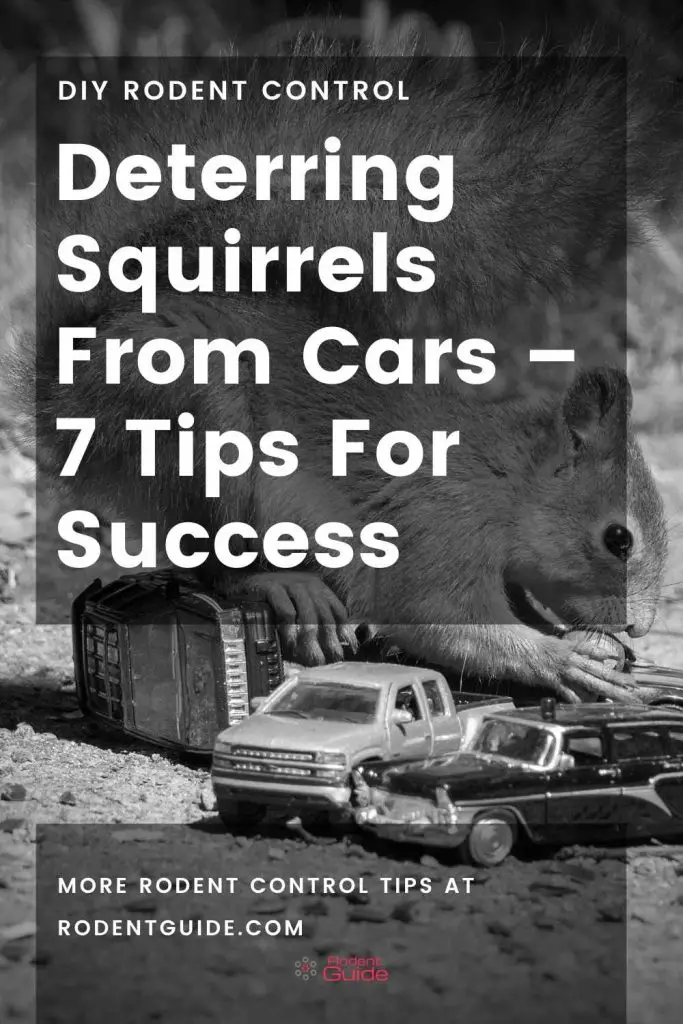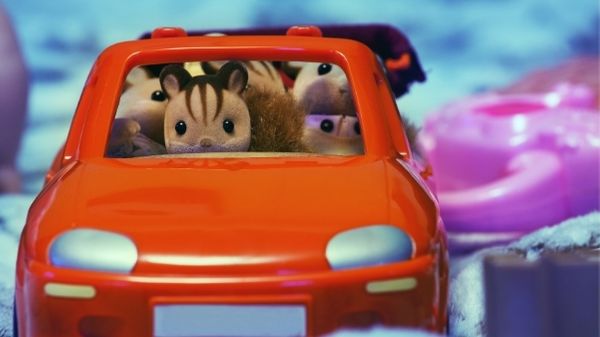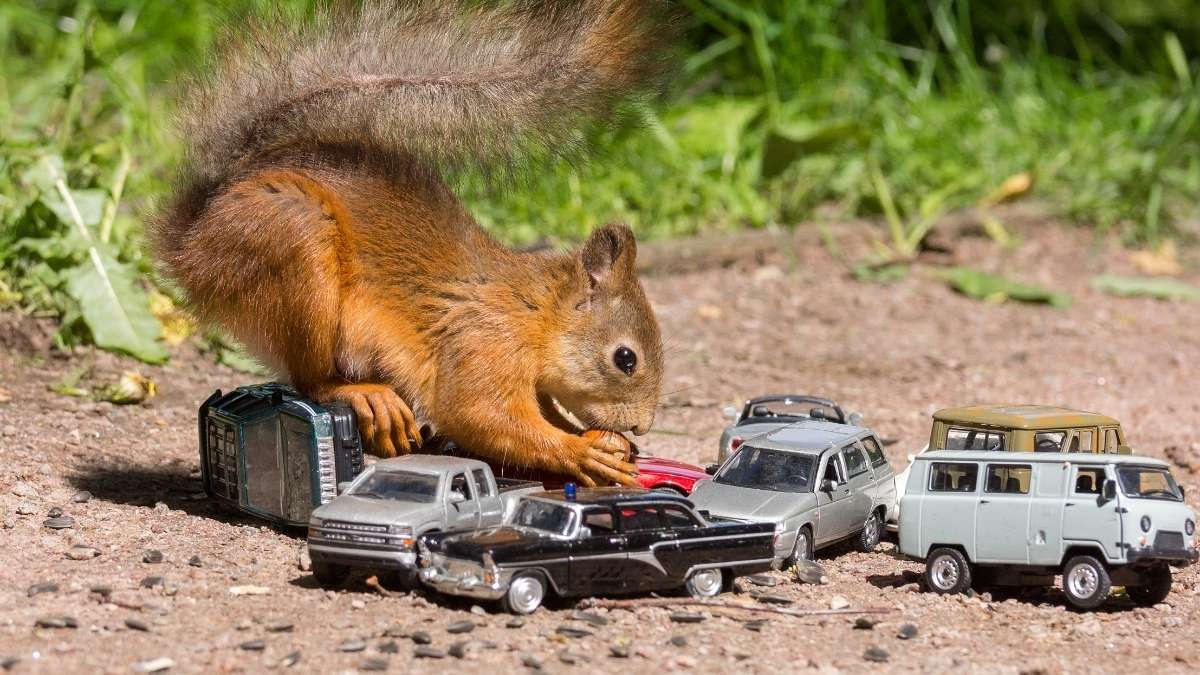Squirrel infestations aren’t just a problem for your attic or basement. If you aren’t careful, your car could become their home.
Unlike other scenarios where we recommend some form of tolerance, you’ll have to convince them to vacate actively.
Living in a car is unsafe for these critters, exposing your vehicle to severe damage.
So, how do you keep squirrels out of your car? Let’s take a look.

Why would a squirrel be in your car?
Squirrels will invade cars because they are warm, dry, and safe.
Although this may happen at any time of the year, it’s more common during winter when it’s freezing outside.
The squirrels will find their way through gaps in the vehicle’s bodywork like air vents. They’ll also be drawn to your car if you leave any water and uneaten food in it.
Watch your engine
This may seem inconvenient, but it’s better to be safe than sorry. If you live in a wooded area and don’t park your car in a garage, squirrels will likely invade your vehicle for warmth.
They’ll leave quite a mess once they ferry nuts, acorns, and nesting materials. They may also chew through parts of your car engine. Having squirrels chewing parts of your car can be very dangerous and costly!
If you drive your car unaware of the damage they’ve done, it could easily malfunction or catch fire, especially if they have been chewing your car wires!
Deterring Squirrels From Cars – 7 Tips

Tip 1: Remove food sources
Leaving food in your car attracts rodents. It could be a pizza slice you didn’t eat or something less significant, like a small piece of candy.
If you must leave food in your car, ensure it is sealed in an airtight container. You should also vacuum your car often to remove all leftovers, particularly if you have children.
If you want to keep squirrels away, then remove all food sources.
Tip 2: Fortify your garage
Parking your car in your garage is much better than leaving it outside, but it doesn’t mean you’re entirely safe.
Squirrels can enter your home through an opening just 2-inches wide. It would help if you plugged all the gaps in your garage with sheet metal or stainless-steel mesh.
Tip 3: Open the hood
The squirrel may have taken up residence because it needs a quiet, safe place for its babies. So, it stands to reason that if you take these things away, the squirrel will leave and take her offspring.
Leave the hood wide open for 1-2 days. This lets significant noise and light into the engine compartment, making the squirrel feel vulnerable.
It may leave your car on its own. If it doesn’t work, you could do a few other things.
Tip 4: Light
Put a bright light under your car’s engine compartment (remember to make it fire-safe).
Squirrels don’t like bright lights, so it will help to convince them to stay away and not chew your wires and set them up home in your car engine!
Tip 5: Sound
Tune a portable radio to a talk show, then place it beneath your car’s engine compartment. Although squirrels don’t mind music, the sound of human voices usually scares them away.
To increase your chances of success, you should keep going for at least 3 days and nights or until the squirrel decides to move.
You’ll need to be patient to convince the squirrel to move.
Do not drive your car before the squirrel/ squirrel family leaves. If you think it’s moved, check your vehicle to be sure. If you don’t see any signs of a nest, call a mechanic to check whether your car is still roadworthy.
Tip 6: Animal Repellent
Apply animal repellent on sections of the engine that don’t get hot. This may include the front tires, bumper, and undercarriage.
If you put it directly under the engine compartment, then start the car, the odor will probably affect you more than the animals you are trying to evict!
Some folks have had success using mothballs, but I haven’t, so I have left that off this.
Peppermint
Like other rodents, squirrels can’t stand the smell of peppermint. It is a fantastic natural squirrel deterrent. Dab several cotton balls or rags with peppermint oil extract. Next, stuff them in nylon stockings and put them where you see the signs of squirrel activity.
Note: be careful with peppermint oil; it might harm pets and small children.
Hot pepper
Most wild animals don’t like hot peppers and will actively try to avoid them.
Stir pepper sauce with cayenne or habanero pepper powder to make a consistent mixture. Apply the mixture to the same areas you sprayed with repellent.
Remember to avoid car parts that get hot, as it will likely irritate the driver if you don’t.
An ample dose around your vehicle’s tires and bumper will dissuade any squirrels or other rodents’ intent on making it their home.
Tip 7: Use Poison (Responsibly)
If things get terrible, you may use poison. This will eliminate your squirrel problem, but it comes at a cost. Besides the fact that you’ll be killing the animal, you’ll also have to get the squirrel carcass out of the engine once the poison takes effect.
You should only use this approach if it’s necessary.
If you have to use poison, the rules are that ensure the squirrel is caught in a live trap to consume in. By placing the poison down and allowing the squirrel to remain free after consuming it, you are risking secondary poisoning and running the risk that the squirrel will die in a hard-to-reach area.
Imagine the squirrel dying in your cavity walls! That will cause a strong odor and probably need to be removed by a professional at an additional cost.
What You Should Not Do

Use Snap Traps
Using snap traps outside is a big no-no for me! Not only do you risk catching other animals, but you also risk a human (kids mostly) stepping on the trap.
Also, be careful when using live catch-traps. While it will help eliminate squirrels in the area, you must remember that you might be caching a mom squirrel. Relocating the squirrel means there might be a nest missing a mom!
Do Not Use Poison (Irresponsibly)
Never use poison outside to catch squirrels or other rodents. The risk of secondary poisoning is too high. Also, a squirrel might die inside your home in your cavity walls, which will cost you a lot of money to remove!
What are the long-term effects of using peppermint oil and hot pepper on car components?
The long-term effects of using peppermint oil and hot pepper on car components are generally considered minimal, but it’s advisable to apply them in a way that minimizes direct contact with sensitive parts to avoid potential damage or corrosion.
How can someone effectively deter squirrels without access to a garage?
For those without access to a garage and needing to deter squirrels, focusing on deterrents that can be applied directly to the vehicle or its immediate surroundings, such as protective car covers or ultrasonic repellents, might be effective strategies.
What are the environmental impacts of using poisons and repellents for squirrels?
The environmental impact of using poisons and chemical repellents for squirrels can be significant, affecting not only the target species but also other wildlife that might come into contact with these substances. It’s crucial to consider less harmful alternatives and follow guidelines to minimize unintended consequences.
Conclusion
Though effective, these methods are not fool-proof. Squirrels are intelligent and may find ways around your most earnest efforts.
If you’ve tried all the advice in this article, but your squirrel problem still won’t go away, you should consider contacting a pest control expert for advice.
I prefer to deal with rodent issues myself, as it can save money; however, if you are not confident, you should seek a professional’s advice.
Good luck!



